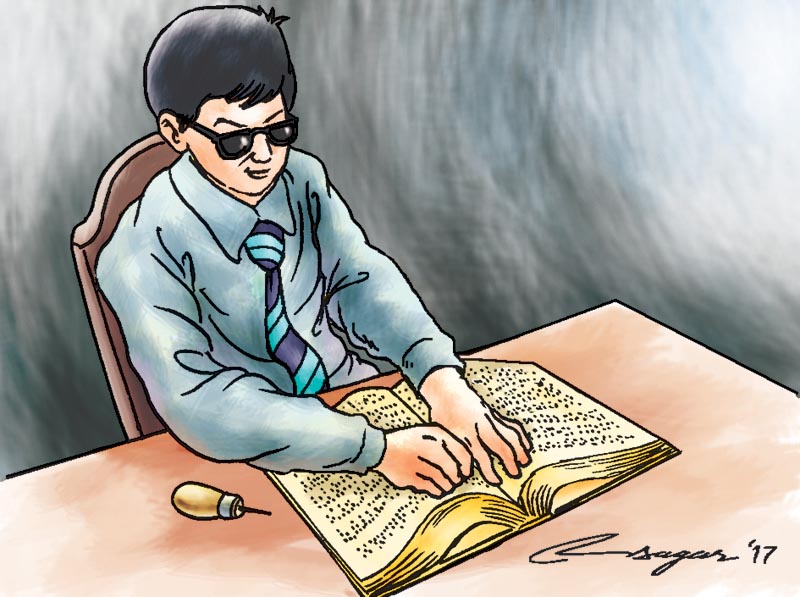Reasonable accommodation: Great landmark
Persons with disabilities, living in rural areas, experience a number of challenges and salient which include: illiteracy, poverty and superstition. Specific to persons with disabilities, these challenges seem formidably insurmountable
Majority of the rural Nepalese societies are still based on traditional values and norms systems. People in rural community are less educated. The education rate has also impacted low awareness on changing concept of disability and barriers faced by the persons with disabilities in the country. Due to the lack of awareness and literacy, the rural population of Nepal (which represents the majority of the population) follows what is given from history and are in status quo and untouched by global world. This type of society still considers the disability as a ‘personal tragedy’.
Disability is highly stigmatized and stereotyped in this type of societies. Majority of the people in the rural societies consider that the person with disabilities committed sins in their previous life so they had to face this pettiness in this life. They consider that it is the god’s wish and no human can bring changes in their life. Persons with disabilities are kept inside or hidden in houses because of ‘family prestige’. Supports and assistance to persons with disabilities are also considered as charity or welfare rather than perceiving them from the rights perspective.
The formation of the UN Convention on the Rights of Persons with Disabilities (CRPD) in 2006 has been hailed as a great landmark in the struggle to re-frame the needs and concerns of persons with disabilities in terms of human rights worldwide. The ratification of CRPD by the government of Nepal in 2010 did not bring any significant practical change in the daily life of persons with disabilities.
Before signing and ratifying the Convention, Nepal did not review its laws and policies in light of the obligations set forth by the Convention. The situation including the acts, laws, policies, environment and attitude of policy makers are thus subject to comprehensive revamping in Nepal in line with the CRPD. However, the ratification of the Convention has definitely paved the way for civil society to demand, urge and pressurise government agencies to consider obligations to promote, protect and fulfill the rights of persons with disabilities in Nepal.
Lack of Reasonable Accommodation is a major barrier for effective inclusion of persons with disabilities in Nepal. Article 2 of CRPD reads the definition of Reasonable Accommodation as follows: “Reasonable accommodation” means necessary and appropriate modification and adjustments not imposing a disproportionate or undue burden, where needed in a particular case, to ensure to persons with disabilities the enjoyment or exercise on an equal basis with others of all human rights and fundamental freedoms.
The term “all human rights and fundamental freedoms” indicates that the Convention requires the provision of reasonable accommodation in all areas of life. The UNCRPD, Article 24 mandates states parties to provide reasonable accommodation within the general education system on an individualized basis to persons with disabilities in order to facilitate their education.
The right to education is made effective with the modifications and adjustments that falls under the definition of reasonable accommodation and that is to be provided immediately. In fact, there are some obvious cases: additional time and having exams on a computer for visually impaired students. In the case of wheelchair users who need access to school there is the option of teaching the students on the ground floor. This would enable the students to have access to school. It is clear that school and classroom based barriers badly influence children with disabilities from being able to get an inclusive education including inaccessible infrastructure at school.
In addition, the schools of rural areas are not disabled girls-friendly as well because the schools do not protect girl’s privacy and safety. As girls become older, having separate toilet facilities in school are essential. The water taps in the schools are not accessible for children who are dwarfs.
Also, it is a major concern that there are no gates or clearly identified boundaries in the schools in rural areas. The parents do not want to send their children with intellectual disabilities to such schools for their overall safety and welfare. There is no provision of a sign language interpreter for those who are hearing impaired and no assistance for the visually impaired such as Braille and large print textbooks in the school as provisioned in the article 9 of CRPD which states that the governments are responsible to enable persons with disabilities including children with disabilities to fully live in all aspects of life by identifying and eliminating barriers to inaccessibility.
In conclusion, persons with disabilities, living in remote rural areas, experience a number of challenges and salient which include: illiteracy, poverty and superstition. Specific to persons with disabilities, these challenges seem formidably insurmountable. Unfortunately, despite their doubly jeopardized status, resulting from a combination of social and economic exclusion, government interventions fail to offer any real remedies. To mainstream disability in all levels of development, the government should provide reasonable accommodation and the individual support required to persons with disabilities.
Joshi is a Disability Rights Lawyer






